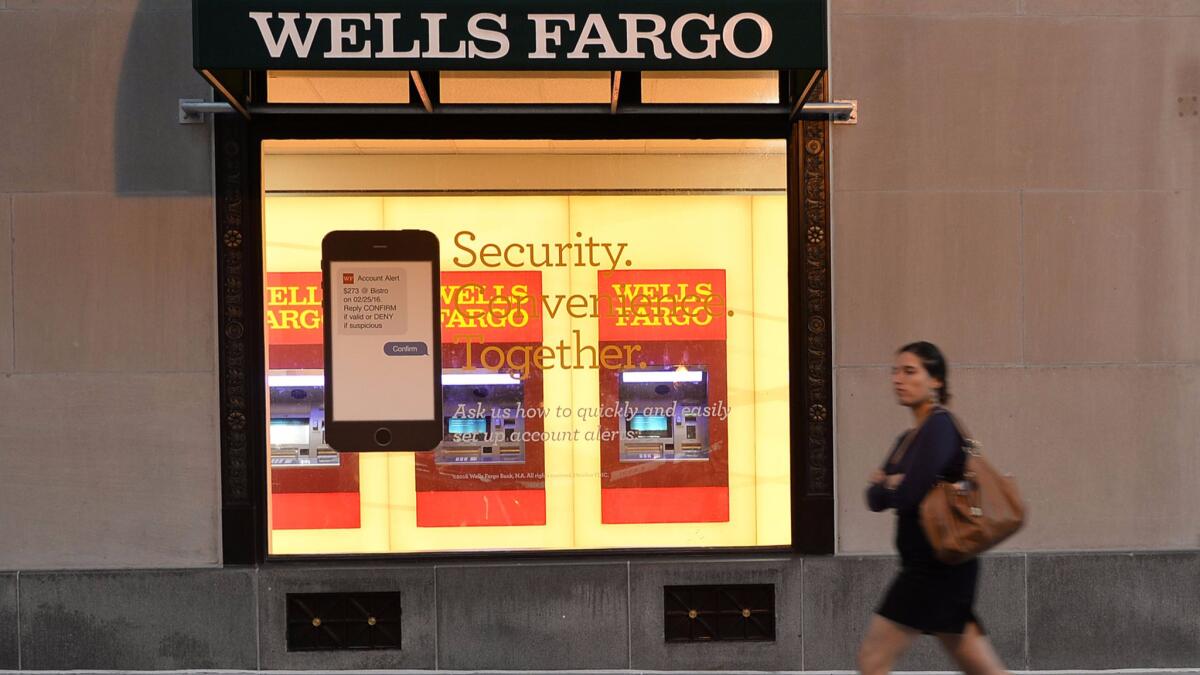After Wells Fargo’s beating on Capitol Hill, it could face local sanctions over accounts scandal

Already the subject of federal investigations and congressional inquiries, Wells Fargo & Co. is now facing criticism from a growing number of state and local officials who want more answers from bank executives or hope to enact sanctions of their own.
On Tuesday, a San Fernando Valley lawmaker plans to question a regional Wells Fargo executive about the bank’s sales practices, while a Los Angeles City Councilman will call on the city to cease doing business with any bank that pressures workers to open unneeded or unwanted accounts.
Officials in other jurisdictions have taken similar actions against the San Francisco institution.
On Friday, Seattle officials sent a letter to the bank saying the city won’t work with Wells Fargo on a $100-million financing deal because of revelations that thousands of bank employees, driven by the bank’s hard-charging sales culture, opened as many as 2 million accounts for customers without their authorization. Earlier in the week, the Chicago City Council voted to suspend Wells Fargo from doing business with the city.
The moves by the two cities followed similar actions by the state treasurers of Illinois and California.
Wells Fargo has expressed disappointment over the moves, noting the unit that does business with governments is separate from the retail division where the unauthorized accounts were created.
That hasn’t stopped local government officials from taking action against the bank, and Los Angeles could be next in line.
City Councilman Paul Koretz plans to introduce a motion that would call for the city to cease doing business with banks that use sales goals deemed to be predatory. The use of sales goals is common across the banking industry, but the practice has been the subject of more scrutiny in the wake of the Wells Fargo scandal that mushroomed last month.
Koretz’s motion would call for changes to the city’s Responsible Banking Ordinance, a 2012 law that requires banks that do business with the city to submit reports on their lending and charitable activities in Los Angeles.
The legislation is supported by the Committee for Better Banks, a union-backed group that’s tried to organize bank workers and has called for banks to end all sales goals, saying they force workers to push unnecessary and potentially harmful financial products on unsuspecting consumers.
“The intent is to begin to look at ways to hold banks accountable to ensure customers are protected from predatory practices,” said Maria Loya, the committee’s L.A. policy director. “Obviously the city can’t regulate the banks, but the city can use its power, through contracts, to really put in protections for consumers.”
Also on Tuesday, state Assemblyman Matt Dababneh (D-Encino), will hold a hearing in Calabasas about the bank’s sales practices. He has questions for the bank but has also invited Wells Fargo customers to attend and raise issues of their own.
Dababneh’s office invited Wells Fargo Chief Executive John Stumpf, who has testified at two recent hearings on Capitol Hill, but the bank is instead sending David Galasso, an executive vice president who oversees Wells Fargo retail bank operations in Northern and Central California.
Dababneh said he hopes the hearing will be an opportunity to learn about the bank’s practices from a lower-level executive who might be more familiar with the the bank’s day-to-day practices. At a House Financial Services Committee hearing last month, Stumpf said multiple times that he did not have enough details to answer questions from lawmakers.
“When you saw the CEO testifying at congressional hearings, you saw a very isolated and out-of-touch set of answers,” Dababneh said. “We’re bringing in someone who had quite a bit of oversight. If someone with his title doesn’t know that level of detail, I don’t know who would.”
The hearing, he said, could be a first step toward state legislation aimed at reining in abusive practices by all banks, not just Wells Fargo.
That could include rules aimed at weakening the arbitration clauses Wells Fargo and other banks use to keep consumer complaints about unauthorized accounts out of court, he said.
Follow me: @jrkoren
The Associated Press contributed to this report.
ALSO
Why L.A. City Atty. Mike Feuer knew the Wells Fargo scandal was going to blow up
Lawmakers spew vitriol at Wells Fargo CEO and ramp up demands for wider probe of banking industry
Senator to push bill to let Wells Fargo customers sue over unauthorized accounts
More to Read
Inside the business of entertainment
The Wide Shot brings you news, analysis and insights on everything from streaming wars to production — and what it all means for the future.
You may occasionally receive promotional content from the Los Angeles Times.









